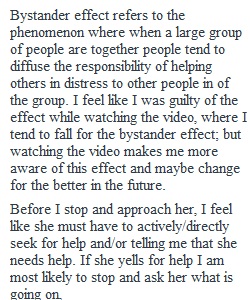


Q Welcome to Discussion Board #16 Chapter 14 Meaning and Values Bystander Intervention People must pass through four decision points before giving help. First, they must notice that something is happening. Next, they must define the event as an emergency. Then, they must take responsibility. Finally, they must select a course of action. Many experiments have shown that each step can be influenced by the presence of other people. Watch the video below: https://youtu.be/OSsPfbup0ac (Links to an external site.) Instructions Answer the following questions below. Your response must be 250 word minimum. Your response to two other classmates is 30 word minimum each in order to receive full credit. Discussion Board Questions: 1. What is the bystander effect? What were your thoughts regarding the video? 2. An elderly woman is at the side of the roach, trying to change a flat tire. She obviously needs help. You are approaching her in your car. What must happen before you are likely to stop and help her? 3. What has shaped you into the person you are today and the values that you possess? Does culture impact your values? Does gender impact your values? 4. What is your philosophy of life? Was there a particular event that aided in the development of your philosophy? 5. "If we do not remain open to basic changes in our views of life, we may find it difficult to adjust to changed circumstances." Do you agree or disagree with this statement? How does apply to the human race?
View Related Questions